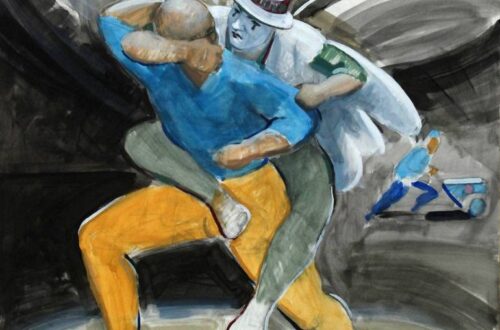-
Colossians 3:18-21
It’s remarkable to me that Paul can move so quickly from arguing against the heresy of Gnosticism and how Christ is the image of the invisible God, the firstborn over all creation to the most practical human concerns and relationships. He is not a scholar in the ivory tower. “For by him all things were created: things in heaven and on earth, visible and invisible, whether thrones or powers or rulers or authorities; all things were created by him and for him. He is before all things and in him all things hold together..For God was pleased to have all his fullness dwell in him, and through him to reconcile…
-
Colossians 3:1-17
Doesn’t it seem a bit ironic that after telling them to avoid people who have lists of rules to obey he would then create a list of rules of his own for us to follow? Paul was a teacher and teachers often depend on lists – especially lists that people can easily memorize and use as guides for their behavior. Of course, the shorter the better but sometimes Paul had fairly lengthy lists that we often had to recite in Sunday School. There are negative lists: Romans 1: They have become filled with every kind of wickedness, evil, greed and depravity. They are full of envy, murder, strife, deceit and malice.…
-
Colossians 1:24-2:20
The earliest Church may have stayed pure and all of one mind sharing everything with each other for a few days or weeks but it soon faced the realities of imperfect human nature. Yes, they were all believers and what would later be called Christians but the perfect harmony could not last for long. “They devoted themselves to the apostles’ teaching and to the fellowship, to the breaking of bread and to prayer. Everyone was filled with awe, and many wonders and miraculous signs were done by the apostles. All the believers were together and had everything in common. Selling their possessions and goods, they gave to anyone who had…
-
Colossians 1:1-20
This morning we are beginning our six weeks in the book of Colossians. It is worth noticing that the same author could have two such different perspectives of Christ and both of them are correct. They are not in conflict but two sides of the same coin. In the same way that the writers of the four Gospels have different accounts, Paul has a Philippian picture of Jesus and a Colossian picture. It was Ray Bakke, an urban sociologist, who first pointed this out to me. In his book “A Theology As Big As The City” he describes splitting a class into two parts. One part reads only the letter…
-
Philippians 2
I know if you were here a couple of weeks ago you had a lesson on this same chapter. However, I remember the line from the Seals and Crofts song, “We May Never Pass This Way Again” and the likelihood of my teaching Philippians again is pretty remote. So, because I love this chapter so much I want to beg your indulgence and say a few things about what Paul has written not only to the church at Philippi but to the church in Tyler. Let’s read the passage slowly: Therefore if you have any encouragement from being united with Christ, if any comfort from his love, if any common…
-
Philippians 3
Philippians has been called Paul’s love letter to the church. Not every love letter has warnings but Paul never missed a chance to remind the believers of the dangers not only surrounding them but also among them. I’ve been reading Walt Whitman recently and he writes the greatest threat to the country was not from the outside but from the inside. We were at war with ourselves. It was John Adams who said, “Remember, democracy never lasts long. It soon wastes, exhausts, and murders itself. There never was a democracy yet that did not commit suicide..Individuals have conquered themselves. Nations and large bodies of men, never.” That is the fear…
-
Ecclesiastes 3
We live in a world of change – and that is by design. It’s not an endless circle of birth, death and reincarnation. It’s not a straight course from birth to death. It’s not fatalism. It is seasons. There is a season for everything. There is no perfect time and no fixed and permanent season. We live “between” changes all our lives. Eternity is in our hearts as Solomon says in verse 11 but everything else is in process. There are six categories of seasons in these 8 verses: Seasons of life Seasons of work Seasons of emotions Seasons of family and friends Seasons of things Seasons of the world…
-
Ecclesiastes 1
1. The lesson this morning is on the meaning of life. It reminds me of a conference a couple of years ago when Os Guinness was assigned the topic “What is Truth?” and given fourteen minutes to speak. What do you say about the meaning of life in the time we have this morning? It’s either too little or too much. So, let’s turn to the first chapter of the book. Ecclesiastes is actually a Greek word for the original Hebrew word “Koheleth” which is better translated Teacher or even Seeker than Preacher. Who is it? It is clearly Solomon, the son of David, the wisest, wealthiest and most powerful…
-
Job 42 and Epilogue
So we come to the end of our study in Job. It’s been like a five act play in some ways. Act 1 is the introduction that sets the scene for the rest of the book. Then there is the rising force that comes with the arrival of the friends, seven days and nights of silence and then their challenges to Job with his defense of his righteousness. Then the climax in chapter 19 when Job says, “I know that my Redeemer lives and in the end he will stand upon the earth. In drama language Act 4 is where the counter parties beat upon the soul of the hero…
-
Job 39-41
We left Job last week in the middle of a terrible storm with lightning flashing all around him and his friends with rain pouring down in sheets and deafening thunder. It is like the storm in King Lear. In part, the storm echoes Lear’s inner turmoil and mounting madness but also a physical, turbulent reflection of Lear’s internal confusion: Blow, winds, and crack your cheeks! rage! blow! You cataracts and hurricanoes, spout Till you have drench’d our steeples, drown’d the cocks! You sulph’rous and thought-executing fires, Vaunt-couriers to oak-cleaving thunderbolts, Singe my white head! And thou, all-shaking thunder, Strike flat the thick rotundity o’ th’ world, Crack Nature’s moulds, all…


